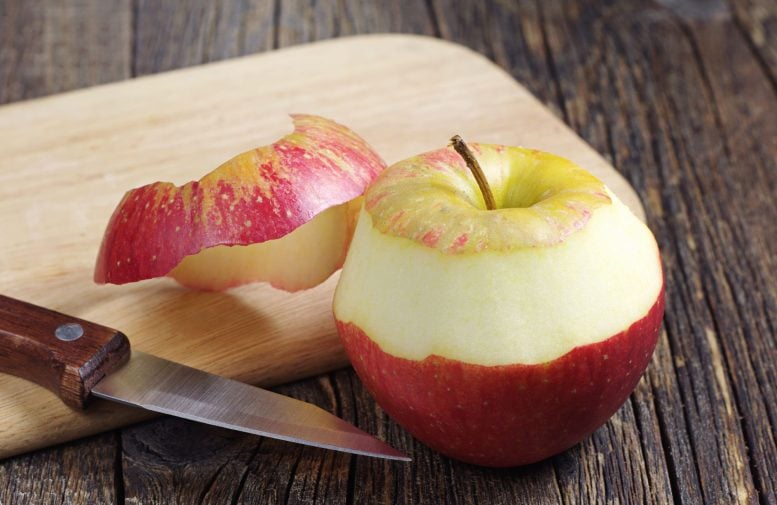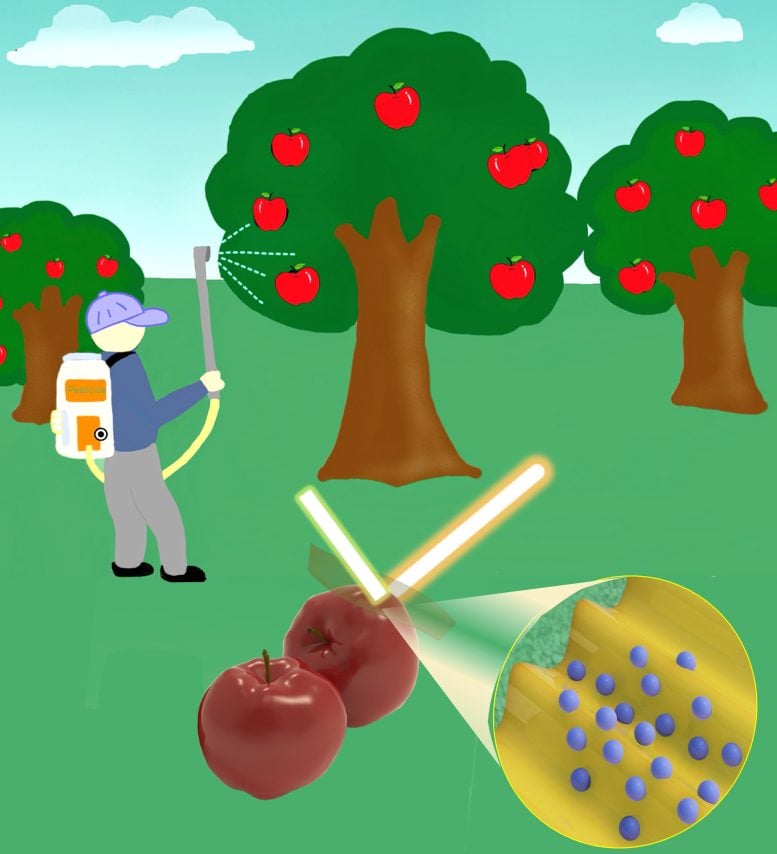
A new study has introduced a technique using surface-enhanced Raman spectroscopy (SERS) to detect low levels of pesticide residues on food, suggesting that washing alone might be insufficient to remove pesticides, and peeling may be necessary.
Pesticides and herbicides are critical to ensuring food security worldwide, but these substances can present a safety risk to people who unwittingly ingest them. Protecting human health, therefore, demands sensitive analytical methods to identify even trace levels of potentially harmful substances. Now, researchers reporting in ACS’ Nano Letters have developed a high-tech imaging method to detect pesticide contamination at low levels, and its application on fruits reveals that current food safety practices may be insufficient.
The analytical method called surface-enhanced Raman spectroscopy (SERS) is gaining popularity as a nondestructive method for detecting chemicals from modern farming on produce. With SERS, metal nanoparticles or nanosheets are used to amplify the signals created by molecules when they are exposed to a Raman laser beam.
The patterns created by the metal-enhanced scattered light serve as molecular signatures and can be used to identify small amounts of specific compounds. Looking to improve SERS sensitivity for pesticide detection, Dongdong Ye, Ke Zheng, Shaobo Han, and colleagues designed a metal-coated membrane they could lay atop farm-grown produce. They also wanted to develop the material to be versatile enough to accommodate an array of other applications.

Development of a New SERS Membrane
The researchers started with a cellulose hydrogel film, which they stretched to form aligned nanoscale wrinkles along its surface. They then immersed the film in a solution of silver nitrate to coat the grooves with SERS-enhancing silver nanoparticles. The resulting membrane was highly flexible and practically transparent in visible light, essential features for SERS signal detection.
In tests of the silver-embedded membrane for food safety applications, the researchers sprayed the pesticides thiram and carbendazim, alone or together, onto apples, air-dried the fruits, and then washed them to mimic everyday practices. When they laid their membrane over the apples, SERS detected pesticides on the apples, even though the chemicals were present at low concentrations. The team was also able to clearly resolve scattered-light signatures for each pesticide on apples sprayed with both thiram and carbendazim, as well as detect pesticide contamination through the fruit’s peel and into the outermost layer of pulp.
These results suggest that washing alone could be insufficient to prevent pesticide ingestion and that peeling would be required to remove potential contamination in the skin and outer pulp, the researchers say. Beyond apples, they also used the SERS membrane system to detect pesticides on cucumbers, shrimp, chili powder, and rice.
Reference: “Cellulose Surface Nanoengineering for Visualizing Food Safety” by Zewan Lin, Xiaotong Fu, Ke Zheng, Shaobo Han, Chaoji Chen and Dongdong Ye, 7 August 2024, Nano Letters.
DOI: 10.1021/acs.nanolett.4c01513
The authors acknowledge funding from the National Natural Science Foundation of China.
6 Comments
This is by design. Water-soluble pesticides dissolve and disappear with any rain or irrigation. We knew this.
Finding an effective way to wash pesticides off, using food-safe solvents or soaps, would be better than removing so much of the fiber. Of course, pesticide residue is the least of your food-safety concerns in China.
I have been using distilled water,organic vinegar or hydrogen peroxide and distilled water to clean my vegetables. Bigger fruit or vegetables, I wash with tap water and a soft brush. It’s amazing how dirty everything is, dirty. I spray the fruit, watermelon, cantaloupe with the vinegar water or hydrogen peroxide and water. I was raised on a ranch. We were organic.
Just discovered this newsletter love it
I can’t remember how many decades ago I read an article about washing not removing pesticides, because they permeate in; I’ve always told people such for years, so research reconfirming the concept isn’t surprising. However, how long did they leave the pesticides on, I presume it may diffuse in deeper the longer it is left, and even peeling won’t help, especially if it’s a soft-skinned fruit like a peach rather than an apple.
Specific pesticides have very well understood half-life metrics, when used responsibly peeling or even washing is not really necessary. (or at least not because of pesticides, but rather because other great apes holding / touching the fruit before you buy it ..)
(this is certainly the case if you buy typically sources fruits and vegetable within the European Union)